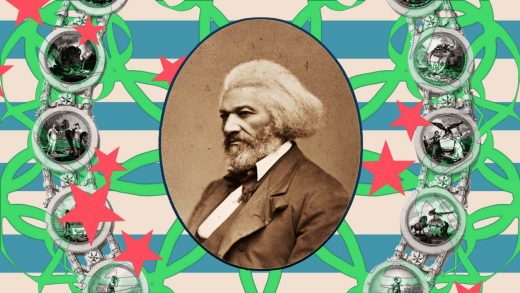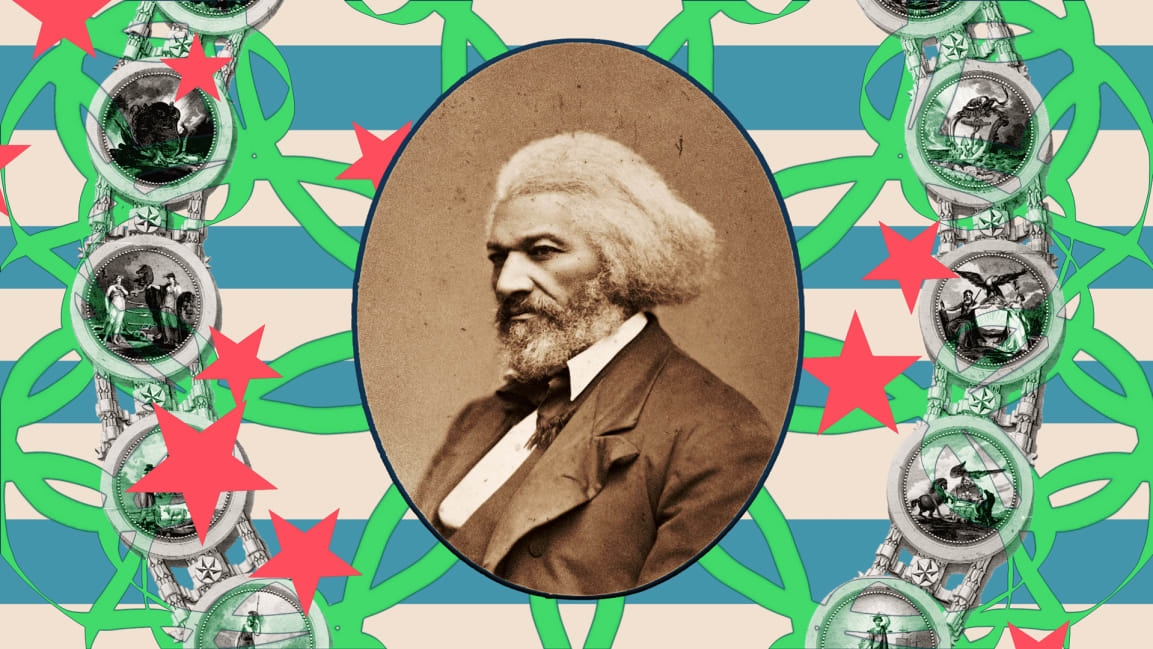A poet explains why he’s optimistic about America
This story is part of Fast Company‘s “USA: Can This Brand Be Saved?” package, approaching the question from a variety of angles and perspectives, ultimately aiming for an in-depth look at what America’s brand is, how it’s changed over the past four years, and where it needs to go from here. Click here to read the whole series.
Reginald Dwayne Betts earned his optimism the hard way. The poet, lawyer, and multidisciplinary artist’s work is inspired by a traumatic experience: At age 16, he was convicted of carjacking and imprisoned for more than eight years. After his release in 2005 he went on to earn a BA, an MFA, and a JD from Yale Law School, practicing for a time as a public defender. He is the author of the memoir A Question of Freedom and three volumes of poetry, including Felon, which explores the injustices baked into the US legal system. Below, he explains why he believes the American brand, despite its contradictions and flaws, remains as vital and important as ever.
Fast Company: If I were to ask 100 Americans to define “the American brand,” I expect I’d hear a range of definitions. How would you define it?
Reginald Dwayne Betts: I would just say Frederick Douglass. We create these heroes, these people who are supposed to represent who we want to be. Frederick Douglass says something about all of the things that we aspire to be. Douglass was the most photographed person of his generation. It wasn’t because he was vain, it was because he had an understanding that it was important to create an image of what an educated Black person in America was during that time period. Douglass also believes in us. [He came] up through slavery through the might of his own intelligence and will and perseverance. I think [his struggle] is emblematic of what this country has had to do because this country has had to constantly grapple with failures and its inadequacies, as well as brilliance. I don’t want to suggest that Douglass himself is a monolith: Douglass encompasses Black women, and Native Americans, and white men and women.
FC: How does your own definition of the American brand compare to whatever you may consider to be the prevailing American definition of that brand?
RDB: I think there are some similarities. I think about the commitment to freedom. I think we would all agree with everything about education that he represented. I think it’s also something about the ability to come up from the bottom . . . it’s something that Americans gravitate to.
FC: You are a lawyer and a legal scholar, and derive some of your poetry from legal documents. How effective are our founding statements—namely the Declaration of Independence and the U.S. Constitution—as brand documents?
RDB: I think the Declaration of Independence—the idea that all men and women are created equal—has inspired a set of ideas that could motivate generations. The constitution is complicated. The Bill of Rights is articulating these inalienable rights but it has these moments where it’s just trying to grapple with the practicalities of being a country, and some of those practicalities just lead people to fail. Part of its beauty is that it’s been able to last so long even though it’s baked with contradictions. [I see it as a] living, breathing document that allows us to correct ourselves. The Declaration is sort of like a foundational principle statement . . . when you’re trying to put that thing into practice, that’s where we make mistakes.
FC: In terms of contributing to brand vitality, to what extent has the influence of those documents been eclipsed or subsumed by the cultural products of this country—music, literature, art, film, science and technology, consumer products?
RDB: I don’t know if they have. They exist in parallel to them. I just did a project with the Declaration of Independence. We worked with some guys at the Phoenix Correctional Institute. We sent them the first paragraph of the Declaration of Independence, the rest was redacted. Then we put the redactions on top of images of their faces. We wanted to argue about who were the founders who wrote the Declaration, and erase the things we thought didn’t need to be in the Declaration. We wanted to find the most essential thing that was [in the Declaration]. Someone would be brilliant if they could turn the Declaration of Independence into something like Coca-Cola. It’s interesting how [slogans] permeate the whole culture, like Nike’s “Just Do It,” that becomes an idea. Nike didn’t create all these documents to explain what they meant by “Just Do It.” Maybe people in elementary school should learn the Declaration of Independence, or they should learn the Gettysburg Address—that’s only 272 words. I don’t know if we have a more important 272 words in the English language, but it’s 272 words most of us haven’t heard before.
FC: Is there a significant disconnect between how most Americans view the American brand and how it’s viewed elsewhere in the world?
RDB: The problem is that most of us haven’t been elsewhere. Thinking about the American brand outside requires a sustained existence outside—sort of like prison, in my experience. The truth is in prison we don’t think about democracy. I don’t have an answer because I haven’t lived outside this country. I think that we haven’t understood the kind of responsibility that (we) carry. I think about what’s happened over the past four years, our stance on immigration and the way we talk about other countries. We aren’t the center of things to the degree that we think.
We aren’t the center of things to the degree that we think.”
But you know that’s the rhetoric of this country, and there’s a difference between the rhetoric and what it actually is, and whether that actuality has lived up to the ideal we want. We have “all men are created equal” then we have slavery. But at least we had the rhetoric that was . . . this country trying to be it’s better self.
FC: How has the brand changed over the last 20 years?
RDB: It’s interesting, I was in prison at the beginning of this century. I’ve been free for the last fifteen and we went from Bush to Barack Obama to Trump. The last 20 years have been a roller coaster. I think in that whole time something of what America wants to be has remained. It’s funny, Joe Biden has been here the whole time, he’s been around for longer than 20 years, and now he’s going to be President.
FC: You mentioned thinking about your own fortunes alongside our country’s. How important do you think individualism is to the American brand?
RDB: I don’t think it’s that important to Americans, but I think it’s important to the American brand. And that’s probably something we work really hard, individually and collectively, to address. [Those of us who are successful] know how much of [that] success is baked in with the support from other folks, but it’s really hard to communicate that publicly.
FC: What about exceptionalism?
RDB: I think of George Orwell and what says about how we have some expressions that are so overused that there is a lack of meaning, or maybe they just never had any meaning at all. I don’t know what we mean by American exceptionalism. I don’t know what to say without sounding like a jukebox. I am interested in what made [Biden winning] Georgia possible and the decades of work citizens did to make that happen. I’m interested in talking about what it means to make Barack Obama or Kamala Harris possible.
I wrote a piece about Kamala Harris and the police. You think about a prosecutor who served as district attorney and attorney general. A lot of people get locked up in this country, and you want to blame somebody. I’ve thought about what I’ve seen her say publicly, and about my mom’s own experiences . . . it’s just really complicated. She’s also the first Black woman Vice President, the first Indian woman to be Vice President, the first person in an interracial marriage to be Vice President. It’s profound. It makes me think of what progress looks like [despite] individual failures. This moment is saying that you can have individual failures and [make] bad decisions and still go on to win the support of so much of the country. The same goes for Joe Biden. Imagine the possibility of a country that allows someone to mess up multiple times [but also] say the most profound thing I’ve ever heard in a debate after President Trump attacked his son’s drug addiction. [That] was one of the most moving things I’ve ever heard anybody say off script. That’s something that makes American beautiful. You want [moments like that] to exist as representative, even if you know it ain’t [the case]. I don’t think there were many moments like that in the past four years—I’m excited for the possibility of more of those.
FC: The American brand has been established by how this country has responded to existential threats. I’m thinking of the civil war, the labor movement, the great depression, civil rights. We’re in what seems like a series of never-ending crises. How do you think our ability to face these challenges has evolved?
RDB: The challenge has changed so much. Nobody could have predicted this. The way we measure how we’ve addressed these challenges is by who we see talking about them. But the scientists who created the vaccine at Pfizer—they were somewhere else working.
FC: What product of symbol comes closest to represent the American brand right now?
RDB: I would create a kaleidoscope of faces. It would be little children who still laugh in the street right now. It’d be senior citizens I see on my block walking with masks on. It’d be healthcare workers. It would be Kamala Harris. It’s be local judges who make decisions to release people from prison because covid has turned jails and prisons into death traps. I would want to see a country rather than one person.
I’m driving to my friend’s house and trying to find somewhere to park and there’s chairs down the whole block. And soon those seats are filled with people who are getting stacks of names to register to vote in different states. Even children are saying “I can’t vote but you should.” This is the first time there’s an election and I feel like people are saying “‘there’s work to be done.” Focusing on what we can do is always a plus.
FC: You’re so optimistic about the American brand . . .
RDB: It’s like . . . I don’t have a plane ticket. I can’t leave. I owe my children optimism and I think I’m going to hold on to that no matter what happens in the election. I think I hold myself to some optimism because my life has been pretty hard, or it was back in 2000. But it’s also been pretty good, I could have had far worse.
FC: How do you maintain or cultivate that optimism?
RDB: There’s always work to do. If we commit ourselves to the work that needs to be done, then it’s a distraction from the pressure. It’s not as if the stress won’t be there, it’s about how you commit to the work.
FC: Is there any art that has been getting you through this period?
Above my bookshelf I have a print from Anselm Kiefer—it’s called “a book with wings.” He makes these sculptures that have asymmetrical wings that don’t look like they belong to the same bird. His work reminds me of the potential and the possibility for flight. If you remember the possibility, you might end up making use of your wings.
(26)



